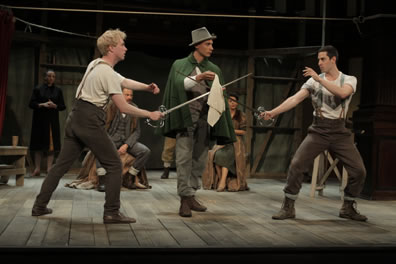The Poison Duel 9#: Poison Duel at the Theatre October 17, 2014
Author: Beach Combing | in : Modern , trackbackThis story comes from a German grammar book with Teutonic compositions dating to 1903
An apothecary once insulted an officer. The officer therefore challenged him to a duel. The duel was to be with pistols. When the opponents had arrived, the apothecary said: ‘I am not used to fighting with pistols, but I have another kind of weapons to propose. Here are two pills, exactly alike in appearance. One of them is poisoned, the other one is not. You are to choose one of them, I shall take the one that is left. We are on equal grounds, if each of us swallows the one he has chosen.’ It is hardly necessary to say that the whole affair was settled with a hearty laugh.
This story though is older. Here is what might be the earliest (?) version in English (1859)
An apothecary had refused to resign his seat at a theatre in Vienna to an officer, who feeling himself insulted sent him a challenge. The apothecary was punctual at the meeting, but observed he had to propose a new way of settling the dispute. He then drew from his pocket a pill-box, and taking therefrom two pills, thus addressed his antagonist: ‘As man of honour, sir, you would not wish me to fight on unequal terms. Here are therefore two pills, one composed of the most deadly poison, the other perfectly harmless. We are, therefore, on equal ground if we each swallow one; you shall take your choice, and I promise faithfully to take that which you leave.’ It is needless to add that the affair was settled by hearty laugh.
That final phrase and other verbal echoes demonstrate that here we have the great grandfather of the Teutonic writing exercise. Frequent readers will recognise, of course, the poison duel, but also a particular and perhaps the original version of it (certainly the oldest attested) whereby the man challenged is a doctor/scientist or in this case an apothecary.
Beach can’t trace it back any further, but here, very possibly, is the seed of the tale. There is no poison but the setting is the theatre and there is a contrast between wisdom and idiocy. The date is 1822, but some fishing in continental sources might find that it is rather older. A macaroni sets upon St Georges (obit 1799, what a life) the famous swordsman at the theatre. When they later meet to duel, St George speaks.
‘It is only fair that I should apprize you who and what I am, before we set to. My name is St. George [sic], and I am maitre d’armes by profession. You will, therefore, gain very little by a contest with me: but I shall make it appear that you are pretty sure to be a loser by this affair if you persevere in it. Nothing is more certain than that you are, as I said before, as great as nuisance as a polecat. Now, if you kill me, you will not be less offensive; but if I run you through the body, as in all probability I shall do, you will be a much greater nuisance than you are now.’ The testy gentleman from teh moment he heard the well-known name of his antagonist, had made up his mind on the business; his choler subsided, and he replied that he had never heard the question of duelling put in so proper a light. He put up his sword, apologised for the trouble he had given, and respectuflly took his leave of St George.
Other contributions: drbeachcombing AT yahoo DOT com



